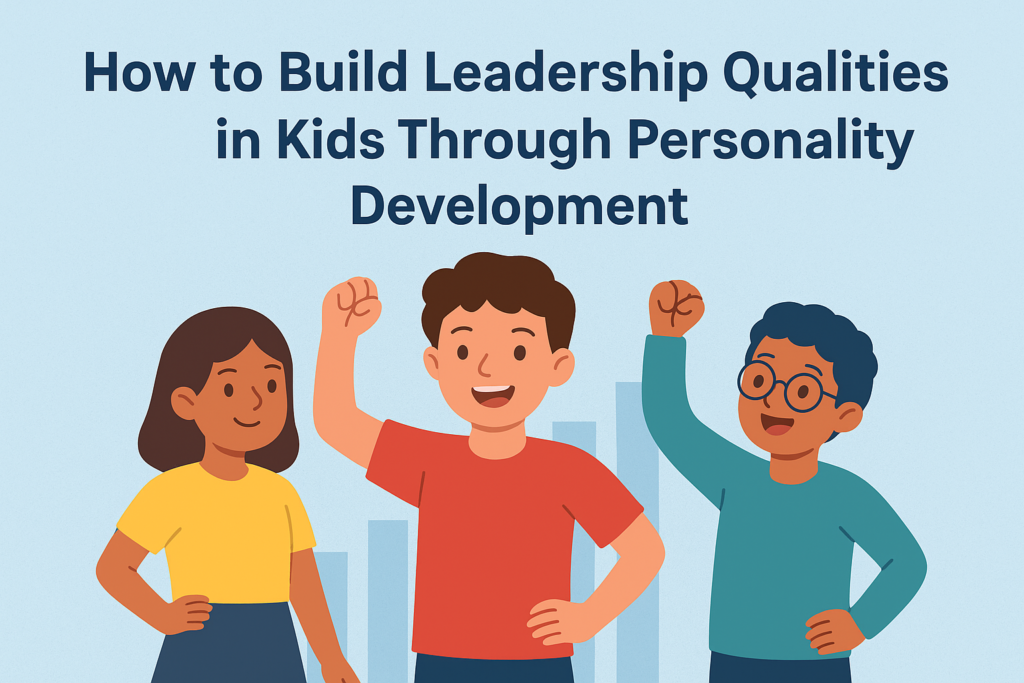How to Build Leadership Qualities in Kids Through Personality Development
Every parent dreams of seeing their child grow into a confident and capable individual who can take charge of situations and inspire others. In today’s fast-changing world, leadership qualities in kids have become as important as academic excellence. But leadership is not something that happens overnight—it develops gradually through structured learning, experiences, and proper guidance.
One of the most effective ways to nurture leadership is through personality development for kids. By building confidence, improving communication, and fostering creativity, personality development lays the foundation for leadership skills that will help children succeed not only in school but in every aspect of life.
Why Leadership Qualities Matter for Kids
Leadership is not just about leading a group; it’s about responsibility, decision-making, and influencing others positively. Children who develop leadership qualities early tend to:
- Communicate their ideas clearly and effectively
- Take responsibility for their actions
- Show empathy and respect towards others
- Solve problems with creative solutions
- Build confidence to face challenges head-on
These qualities prepare kids to excel in academics, social life, and later, in their careers. Leadership also encourages independence, resilience, and adaptability—skills essential in today’s competitive world.
Personality Development: The Foundation of Leadership
Personality development plays a crucial role in shaping leaders because it focuses on holistic growth. It goes beyond book knowledge and emphasizes skills like communication, self-confidence, teamwork, and emotional balance.
Here’s how personality development contributes directly to leadership:
- Confidence Building – Leaders must believe in themselves before others can believe in them.
- Communication Skills – Effective leaders know how to express ideas clearly.
- Problem-Solving Ability – Personality growth encourages critical and logical thinking.
- Team Spirit – A good leader values teamwork and collaboration.
- Emotional Intelligence – Leaders need empathy to understand and motivate others.
By nurturing these traits, parents and teachers create a strong foundation for children to grow into leaders.
Practical Ways to Build Leadership Qualities in Kids
- Encourage Public Speaking
Public speaking is one of the most powerful tools for both personality development and leadership. Children who learn to express themselves confidently in front of others naturally develop leadership presence. Parents can encourage participation in debates, storytelling competitions, or even simple home presentations.
Example: A child leading a small storytelling session for siblings or friends practices confidence, articulation, and influence—key leadership traits.
- Give Them Responsibilities at Home
Assigning responsibilities helps children learn accountability and decision-making. Simple tasks like organizing a family event, helping plan a meal, or mentoring a younger sibling build responsibility and leadership skills.
Tip: Praise the effort more than the result. This motivates children to take responsibility without fear of failure.
- Involve Them in Group Activities
Sports, theater, and school projects are excellent for teaching teamwork. In a group, kids learn how to cooperate, listen to others, resolve conflicts, and sometimes take initiative. These experiences mirror real-world leadership challenges.
Example: A child acting as a sports team captain learns leadership by motivating peers, handling disagreements, and strategizing for success.
- Teach Problem-Solving Skills
Instead of immediately solving problems for children, guide them to think independently. Ask open-ended questions like, “What do you think we should do?” or “Can you suggest a better way?” This builds their ability to analyze situations, make decisions, and lead with solutions.
- Promote Creativity and Innovation
Creative thinking is essential for visionary leadership. Encourage kids to explore hobbies like creative writing, art, coding, or music, which give them space to think differently and find unique solutions. Leaders often stand out because of their innovative ideas.
- Introduce Personality Development Courses
Sometimes, structured guidance is needed to polish leadership qualities. Enrolling kids in personality development classes helps them improve communication, confidence, emotional balance, and decision-making in a systematic way. These courses provide real-life practice that prepares kids for future leadership roles.
Personality Development Activities Parents Can Try at Home
Here are some simple activities parents can use to encourage leadership qualities:
- Role-Playing: Let your child play the role of a leader—like a teacher, manager, or even a prime minister—and encourage them to take decisions.
- Storytelling with a Twist: Ask your child to narrate a story and then come up with an alternate ending. This enhances creativity and decision-making.
- Group Games: Play games that require teamwork and strategy, like building blocks, puzzles, or board games.
- Journaling: Encourage kids to write about their daily experiences. Journaling builds self-reflection, a key leadership quality.
Role of Parents and Teachers in Developing Leaders
Parents and teachers are the guiding pillars in a child’s leadership journey.
- Parents’ Role:
- Provide opportunities for decision-making at home
- Encourage independence while offering guidance
- Appreciate efforts and build self-confidence
- Be role models—children often mirror parental behavior
- Teachers’ Role:
- Offer leadership opportunities like class monitorships or group leaders
- Recognize and reward initiative taken by children
- Encourage participation in extracurricular activities
- Teach teamwork and empathy through collaborative learning
When parents and teachers work together, children develop leadership naturally in both academic and social environments.
Real-Life Example: Leadership in Action
Consider a 9-year-old student who was extremely shy but enrolled in a public speaking and personality development program. Over time, she began leading small class presentations. By the end of the year, she confidently hosted the annual school function. This transformation shows how personality development can unlock hidden leadership potential in children.
Long-Term Benefits of Leadership Skills in Kids
Kids who develop leadership qualities through personality development gain:
- Confidence for Academic Success – They participate more actively in class and perform better.
- Better Career Opportunities – Strong leadership is valued in every profession.
- Emotional Strength – Leaders handle stress and failures with resilience.
- Positive Influence – They inspire and motivate peers.
- Lifelong Independence – They grow into individuals capable of making strong decisions.
Conclusion
Building leadership qualities in kids is not a one-time effort but a continuous process. With consistent support from parents, teachers, and structured personality development activities, children can grow into confident leaders who inspire and influence others.
By encouraging public speaking, assigning responsibilities, promoting creativity, and teaching teamwork, we can shape children into future leaders. The journey begins with small steps but leads to a big transformation—helping kids not only succeed in academics but also shine as responsible, empathetic, and visionary leaders of tomorrow.

